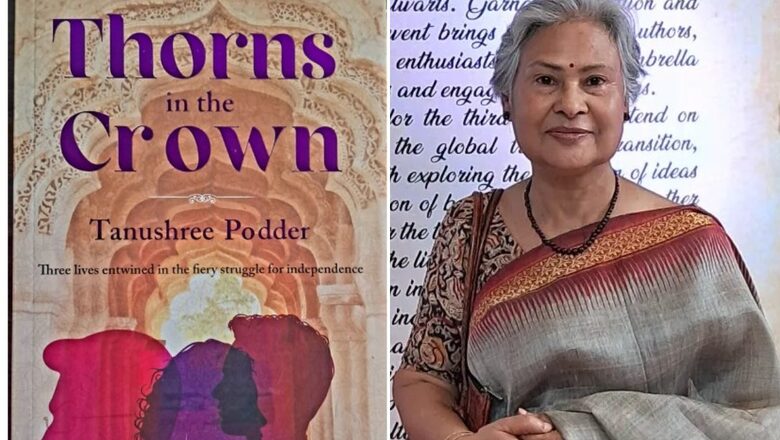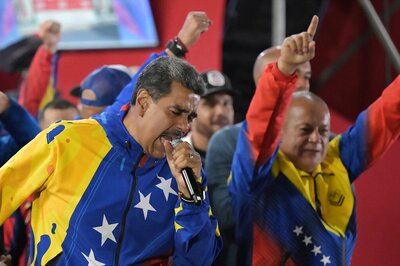
views
Tanushree Podder is a renowned Indian author, who has written across genres including history, mystery, military, crime and the paranormal. Her diverse list of books includes ‘Boots Belts Berets’, ‘A Closetful of Skeletons’, ‘Solo in Singapore’, ‘Escape from Harem’, ‘Nurjahan’s Daughter’, ‘No Margin for Error’ etc.
Despite not being a historian, Podder skillfully navigates historical realms and eras with her stories and characters, unveiling a world often forgotten in the modern imagination. She is back with her 18th novel, titled ‘Thorns in the Crown’.
The book is a captivating historical fiction that unfolds against the backdrop of India’s quest for independence from British rule. The storyline unfolds across four significant epochs in global history, mirroring the complete trajectory of India’s pursuit of national independence. Navigating through the lives of three individuals with diverse backgrounds and perspectives, the book delves into the events that shaped the tumultuous times of revolution and societal transformation.
Three of Podder’s books, ‘Boots Belts Berets’, ‘A Closetful of Skeletons’, and ‘The Girls in Green’, are also being adapted into a web series.
In an interview, Podder spoke about the research involved in writing historical fiction and her approach to the genre and more…
Edited excerpts from the interview:
The book’s title is intriguing. What inspired your choice of this particular title for the book?
I am very particular about titles, and I spend a lot of time thinking about the right title. ‘Thorns in the Crown’ includes the word ‘crown’ which symbolises the British Raj and the ‘thorns’ symbolise those who oppose it in a violent, revolutionary manner.
You have written many fiction and non-fiction books. As a writer, which do you enjoy more?
I am an impulsive writer. I write about subjects that make me curious and throw up a challenge or one that makes me feel strongly about. It’s very satisfying to write on a subject that resonates with my emotions at a particular time.
While many authors tend to stick to a specific genre, you have ventured into different ones. ‘Thorns in the Crown’ is a historical fiction, and you’ve also written thrillers. Is it challenging to transition from one genre to another?
It is challenging but I enjoy switching from one genre to another. Writing exclusively in one genre tends to become monotonous and lacks novelty. Exploring diverse genres allows me to encounter new perspectives and immerse myself in fresh ideas, keeping the creative process vibrant and engaging. Besides, I learned a lot while researching various genres.
‘Thorns in the Crown’ presents an immense amount of detailed research. Could you share insights into your research process for elements such as the British rule, historical events, and the characters portrayed? And how long did it take to write the book?
My research started in 2001 when I visited the Cellular Jail. I decided to write a book wherein the freedom fighters were imprisoned in the Cellular Jail. I was not satisfied with the way the book was shaping up, so I underwent numerous cycles of writing and rewriting to refine both the characters and the narrative. The amount of research was extensive, as I had to get the facts right. Because that is very important. One day, I decided enough is enough and that it needed to be done. That is when I sat down and finished the book. So what you have now is my hard work of 22 years.
What was your biggest hurdle in writing ‘Thorns in the Crown’?
The most significant obstacle I faced was navigating my emotions. Given my family background of freedom revolutionaries— with my grandmother and aunt as freedom fighters and my husband as a retired army officer— the topic held immense personal significance. I wanted to narrate the tale of those unheard prisoners who made immense sacrifices for our country’s freedom. While many authors delve into the lives of prominent freedom fighters such as Bhagat Singh, Subhas Chandra Bose etc, there are very few books exploring this part of the freedom struggle.
However, I made a conscious decision to detach myself from these emotions and approach the storytelling with the necessary objectivity.
Numerous significant events unfolded in the country during that period, some of them quite harrowing. It must have posed a challenge to incorporate all these events into a single book. Can you shed light on how that process unfolded for you?
The manuscript initially stretched to 500-600 pages. So, I had to sift through the material, cut it down in half, write, and rewrite because there are certain limitations when you’re writing a book. I wrote a sequel to one of my books because it was so long.
So do we see a sequel coming out?
No, I haven’t thought about it yet.
Coming to the characters, I felt Olivia was the best character among the three, her inner turmoil was described very well. Which character(s) in this book really spoke to you?
Indraneel’s character resonated with me on a personal level as I come from an army family. Hailing from a humble background of patriots, he aspires to liberate India from British rule. Engaging in activism, he takes up arms, leading to a life on the run, imprisonment, and torture in the Cellular Jail. His experiences of adventure and suffering profoundly alter him. Later in life, he joins a political party, which offers him the opportunity to reinvent himself. Indraneel, the revolutionary, transforms into Indraneel, the self-serving politician.
During your research, did you come across any events or instances that you found too disturbing or horrifying to include in your book?
No, not particularly. Indraneel’s experience with Subash Chandra Bose’s Indian National Army was not the kind he expected. He witnessed the Indian soldiers of INA being discriminated against and abused by the Japanese soldiers in Burma. I thought it was a little controversial, but then I found out it is a historical fact and so I decided to include it because readers deserve to know the facts.
You worked in the corporate sector for eight long years and took to writing later in life. How did you stumble upon writing as a career choice?
I’ve always been a writer. I used to write part-time when I was in the corporate sector. However, I became a full-time writer after I got married because that is when I got the time to explore new things and places. Initially, I began as a freelance writer, crafting stories for diverse publications. Over time, I evolved into an author, initially focusing on non-fiction and later making the shift to fiction.
What’s next for you? What are you working on now?
Two books are coming out next year. Both are for young adults and are non-fiction. One is on the Army and the other is an inspirational book for younger adults, which Harper Collins will be publishing.
Views expressed in the above piece are personal and solely that of the author. They do not necessarily reflect News18’s views.


















Comments
0 comment